Seventy years ago, the Geneva Agreement on the cessation of hostilities in Vietnam was signed, opening a new page in the struggle for national liberation and reunification of our people. After 70 years, the lessons from the negotiation, signing and implementation of the Geneva Agreement still hold value for the cause of national construction, development and defense today.
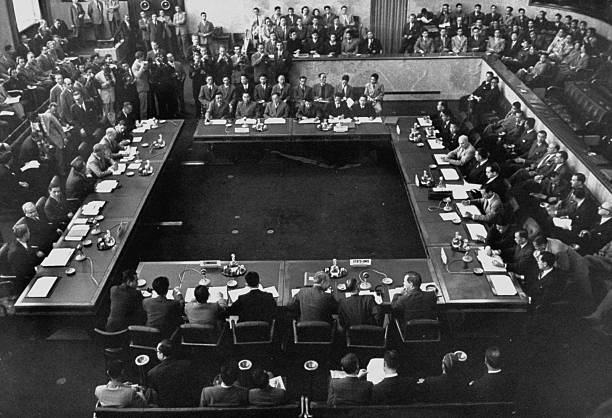
Seventy years ago, the Geneva Agreement on the cessation of hostilities in Vietnam was signed, opening a new page in the struggle for national liberation and reunification of our people. After 70 years, the lessons from the negotiation, signing and implementation of the Geneva Agreement still hold value for the cause of national construction, development and defense today.
The historical significance and significance of the Geneva Agreement
In late 1953, faced with strong changes in the battlefield situation in Indochina, our Party and President Ho Chi Minh advocated launching a struggle on the diplomatic front, coordinating with the 1953-1954 Winter-Spring strategic offensive to end the war and restore peace in Vietnam and the whole of Indochina. In an interview with a Swedish journalist on November 26, 1953, President Ho Chi Minh affirmed: "If the French Government has learned a lesson from the war in recent years and wants to reach a ceasefire in Vietnam by negotiating and resolving the Vietnam issue peacefully, the People and Government of the Democratic Republic of Vietnam are ready to accept that wish" and "the basis of the ceasefire in Vietnam is that the French Government sincerely respects the true independence of Vietnam"[1].
On May 8, 1954, exactly one day after the Dien Bien Phu victory that "resounded throughout the five continents and shook the world", the Geneva Conference began to discuss the issue of restoring peace in Indochina. After 75 days of intense and complicated negotiations with 7 plenary sessions and 24 meetings at the head of delegation level, the Geneva Agreement was signed on July 21, 1954. Together with the Declaration on the issue of restoring peace in Indochina and the Indochina Armistice Agreement, the Vietnam Armistice Agreement affirmed Vietnam's independence, sovereignty, unity and territorial integrity, stipulated that foreign troops must withdraw from Indochina, determined that military demarcation lines were only temporary and that each Indochinese country would hold free general elections to unify the country, etc.
In the "Appeal after the success of the Geneva Conference" on July 22, 1954, President Ho Chi Minh assessed: "The Geneva Conference has ended. Our diplomacy has achieved great success" [2]. Indeed, if in the 1946 Preliminary Agreement, France only recognized Vietnam as a free country within the French Union, then with the Geneva Agreement, for the first time in the history of our nation, Vietnam's basic national rights of independence, sovereignty, unity and territorial integrity were officially affirmed in an international treaty and recognized by the countries attending the Geneva Conference. This was a very important political and legal basis for our people to fight on the political and diplomatic front in the cause of liberating the South and reunifying the country later.
Along with the Dien Bien Phu victory, the signing of the Geneva Agreement successfully ended the resistance war against French colonialism of our people as well as completely ended the domination of old colonialism that lasted nearly 100 years in Vietnam. With that meaning, the Agreement opened a new strategic period of the Vietnamese revolution: building socialism in the North, at the same time carrying out the People's national democratic revolution in the South to fully realize the goal of national independence and national unification.
The victory at the Geneva Conference originated from the correct revolutionary line and the wise leadership and direction of the Party and President Ho Chi Minh; from the burning desire for peace, patriotism, and the mettle and intelligence of the Vietnamese people, forged through thousands of years of building and defending the country. The Geneva Agreement is the crystallization of the results of the indomitable and persistent struggle of our army and people, from the Viet Bac victory in the Fall - Winter of 1947 to the Fall - Winter Border Campaign in 1950 and the Winter - Spring strategic offensive in 1953 - 1954, culminating in the Dien Bien Phu victory.
Along with the 1946 Preliminary Agreement and the 1973 Paris Agreement, the 1954 Geneva Agreement is a historical milestone in Vietnam's revolutionary diplomacy, bearing the imprint of Ho Chi Minh's ideology, style and diplomatic art. The Geneva Conference has forged leaders who are also excellent diplomats in the Ho Chi Minh era such as comrades Pham Van Dong, Ta Quang Buu, Ha Van Lau and many other outstanding diplomatic cadres. Looking back on the 70th anniversary of the signing of the Geneva Agreement, we are infinitely grateful to President Ho Chi Minh and previous generations of revolutionaries as well as the immense sacrifices of our army and people in the resistance war against French colonialism.
We always remember the pure solidarity and support and assistance of the people of Laos, Cambodia, socialist countries and peace-loving people in the world, including the French people, for Vietnam throughout the resistance war against colonialism and imperialism. Therefore, the Geneva Agreement was not only a victory for Vietnam, but also a common victory for the three Indochinese countries and also a victory for oppressed peoples in the struggle for national liberation. Along with the victory at Dien Bien Phu, the Geneva Agreement strongly encouraged the movement for peace and national independence, opening the way for the collapse of old colonialism all over the world. From 1954 to 1964, 17 out of 22 French colonies gained independence; in 1960 alone, 17 countries in Africa declared independence.
Eternal lessons for Vietnamese diplomacy imbued with the identity of "Vietnamese bamboo"
Negotiating, signing and implementing the Geneva Agreement is a valuable handbook on the Vietnamese school of foreign affairs and diplomacy with many valuable lessons on principles, methods and diplomatic art, bearing the strong identity of Vietnamese diplomacy in the Ho Chi Minh era. First of all, it is a lesson on steadfast independence and autonomy on the basis of national interests. The process of negotiating and signing the Geneva Agreement gives us a deeper understanding of the value of the principle of independence and autonomy in international affairs. Because all countries are for their own interests, only steadfast independence and autonomy can help us maintain the initiative and ensure the highest national interests.
Second , the lesson of combining national strength with the strength of the times, linking national solidarity with international solidarity to create "an invincible strength". Besides maximizing the strength of the righteous flag and the great national solidarity bloc, our Party has had the correct policy of constantly expanding international solidarity, first of all solidarity with Laos, Cambodia, socialist countries, international friends and peace-loving people in the world.
Third, the lesson of being steadfast in goals and principles, yet flexible and adaptable in strategies according to the motto "with unchangeables, responding to all changes". As President Ho Chi Minh affirmed, "Our unchangeable goals are still peace, unity, independence, and democracy. Our principles must be steadfast, our strategies flexible"[3], in negotiating and implementing the Geneva Agreement, the "unchangeable" root is Vietnam's independence, unity, and territorial integrity. That is the red thread that runs through the 1973 Paris Agreement later. And "unchangeables" means that while the final goal cannot be fully realized, there can be flexibility and variation in strategies to gradually achieve the unchangeable goal. That is a method and art of Ho Chi Minh's diplomacy that has been inherited, creatively applied, and developed in our country's renovation and international integration; At the same time, it demonstrates the "Vietnamese bamboo" identity of Vietnam's revolutionary diplomacy, "firm roots", "strong trunk", "flexible branches".
Fourth, the lesson of valuing research, assessing and forecasting the situation, "knowing oneself", "knowing others", "knowing the times", "knowing the situation" in order to "know how to advance", "know how to retreat", "know how to be firm", "know how to be gentle". This is a profound lesson, especially in the context of the world currently undergoing great, complex and unpredictable changes, it is necessary to promote research and forecasting of the world situation, especially the movement of major trends, adjusting strategies and policies of partners, on that basis proactively having appropriate responses for each partner and each issue.
Fifth, the lesson of using dialogue and peaceful negotiations to resolve disagreements and conflicts in international relations. Along with the decision to launch the Winter-Spring 1953-1954 strategic offensive, our Party advocated using peaceful negotiations to end the war, thereby opening the way to a negotiation to end the war in Indochina. Although there may be different perspectives, it cannot be denied that the Geneva Conference left a lesson of the times on resolving disagreements and international conflicts by peaceful means, especially in the context of many complex conflicts taking place in the world today.
Sixth, the overarching lesson is the Party's unified and absolute leadership over the revolutionary cause of our people in general and the diplomatic front in particular. The Party has put forward correct revolutionary policies, guidelines and strategies, opened a proactive diplomatic front, closely coordinated and unified with the political and military fronts to create a combined strength, ensuring the highest national interests.
The above-mentioned outstanding lessons and many other valuable lessons from the Geneva Agreement have been inherited, creatively applied and developed by our Party throughout the process of negotiating, signing and implementing the 1973 Paris Agreement as well as in the current implementation of foreign affairs. In nearly 40 years of implementing Doi Moi, we have always consistently implemented a foreign policy of independence, self-reliance, diversification and multilateralization; proactively and actively integrated comprehensively and extensively into the international community; been a friend, a reliable partner and an active and responsible member of the international community. Implementing this correct foreign policy, to date, our country has established diplomatic relations with 193 member countries of the United Nations, has strategic partnerships and comprehensive strategic partnerships with 5 permanent members of the United Nations Security Council, and has a network of strategic partnerships and comprehensive partnerships with 30 countries. Vietnam is an active and responsible member of more than 70 major regional and international organizations and forums such as the United Nations, ASEAN, WTO, APEC, ASEM...; has participated in and is negotiating 19 free trade agreements, creating an open economic network with about 60 economies around the world.
Promoting the lessons of the Geneva Agreement and the glorious tradition of Vietnam's revolutionary diplomacy, the entire diplomatic sector under the leadership of the Party is determined to build a strong, comprehensive, and modern Vietnamese diplomacy, making worthy contributions to the successful implementation of the Party's 13th National Congress' foreign policy for the goal of a rich people, a strong country, democracy, fairness, and civilization./.
-----------
[1] National Political Publishing House - Truth, 2011, Ho Chi Minh Complete Works, Volume 8, page 340.
[2] National Political Publishing House - Truth, 2011, Ho Chi Minh Complete Works, Volume 9, page 1.
[3] National Political Publishing House - Truth, 2011, Ho Chi Minh Complete Works, Volume 8, page 555.
Bui Thanh Son, Member of the Party Central Committee, Minister of Foreign Affairs
According to dangcongsan.vn
Source



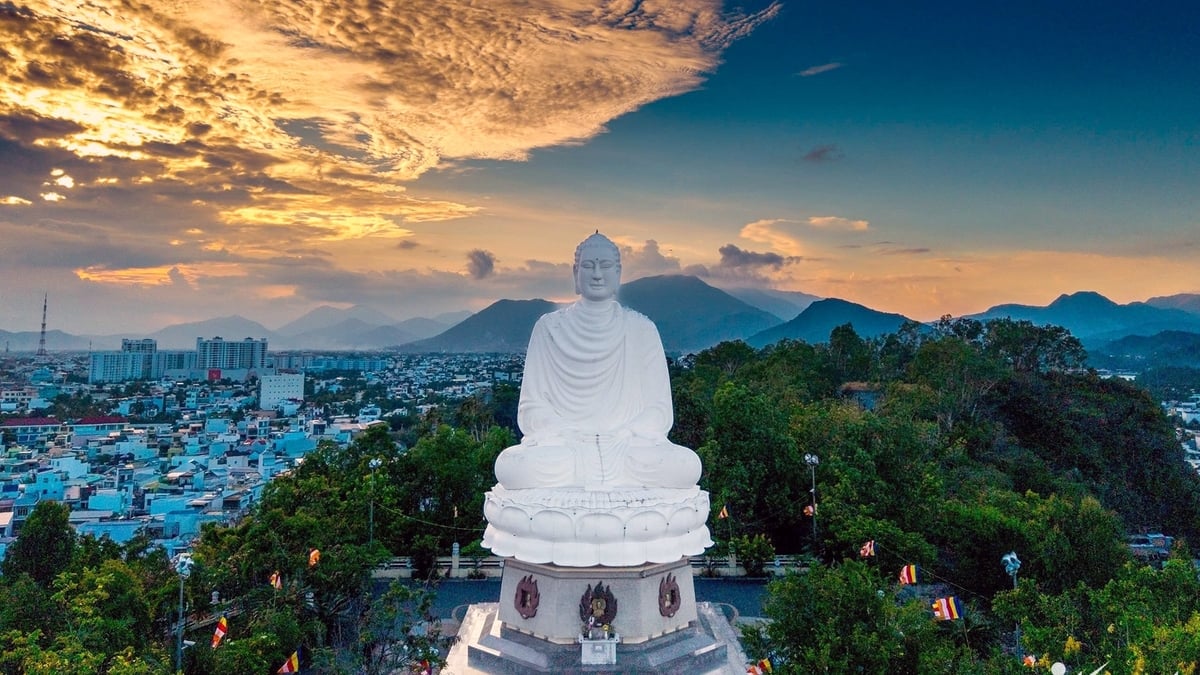
![[Photo] Panorama of the Opening Ceremony of the 43rd Nhan Dan Newspaper National Table Tennis Championship](https://vphoto.vietnam.vn/thumb/1200x675/vietnam/resource/IMAGE/2025/5/19/5e22950340b941309280448198bcf1d9)
![[Photo] Close-up of Tang Long Bridge, Thu Duc City after repairing rutting](https://vphoto.vietnam.vn/thumb/1200x675/vietnam/resource/IMAGE/2025/5/19/086736d9d11f43198f5bd8d78df9bd41)
![[Photo] President Luong Cuong presents the 40-year Party membership badge to Chief of the Office of the President Le Khanh Hai](https://vphoto.vietnam.vn/thumb/1200x675/vietnam/resource/IMAGE/2025/5/19/a22bc55dd7bf4a2ab7e3958d32282c15)
![[Photo] General Secretary To Lam attends the conference to review 10 years of implementing Directive No. 05 of the Politburo and evaluate the results of implementing Regulation No. 09 of the Central Public Security Party Committee.](https://vphoto.vietnam.vn/thumb/1200x675/vietnam/resource/IMAGE/2025/5/19/2f44458c655a4403acd7929dbbfa5039)
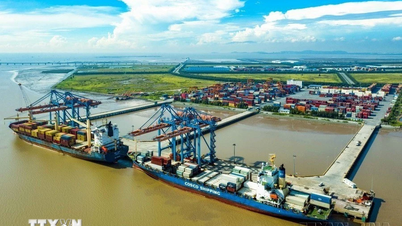






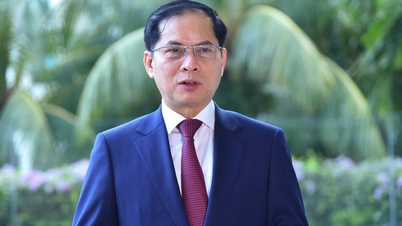


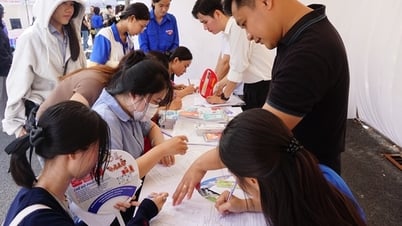
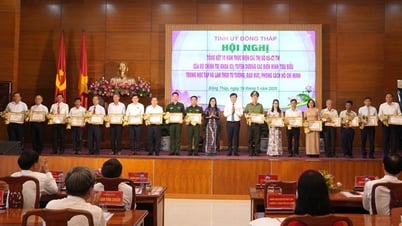
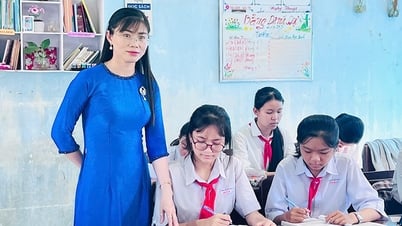
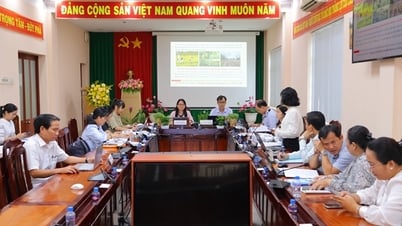
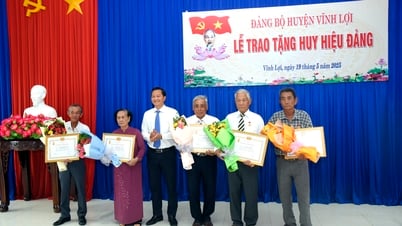
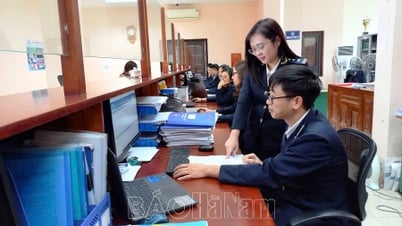







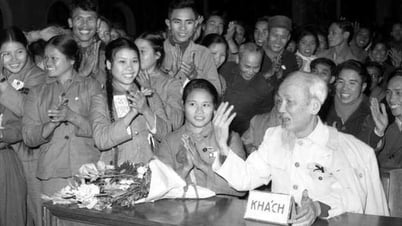































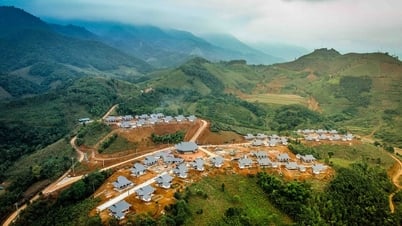












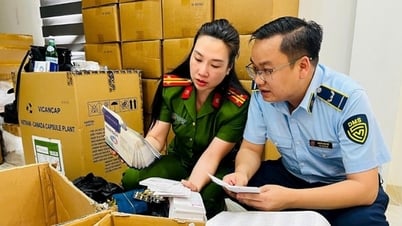

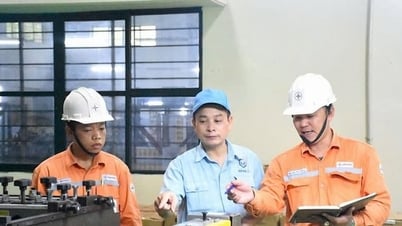
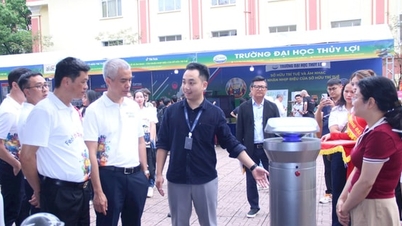
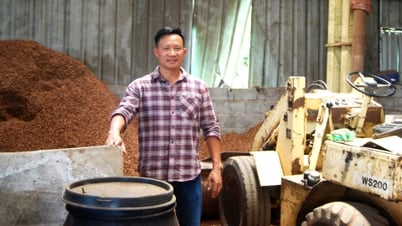

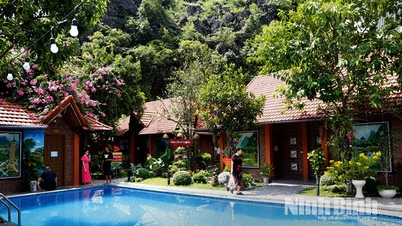

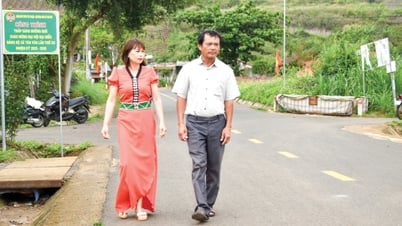






![[VIDEO] - Enhancing the value of Quang Nam OCOP products through trade connections](https://vphoto.vietnam.vn/thumb/402x226/vietnam/resource/IMAGE/2025/5/17/5be5b5fff1f14914986fad159097a677)


Comment (0)